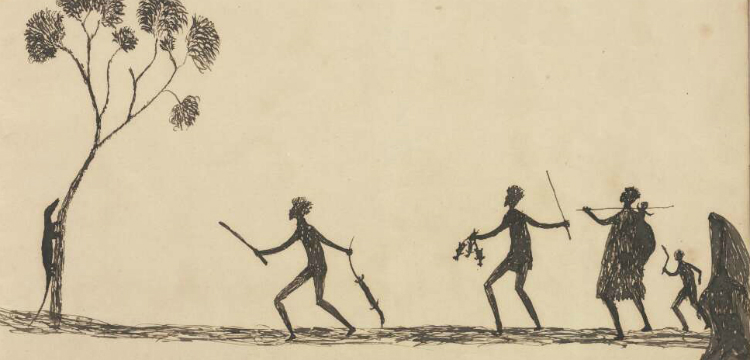Uncovering the Stories Behind Indigenous Australian Last Names: A Journey of Identity and Resilience
Uncovering the Stories Behind Indigenous Australian Last Names: A Journey of Identity and Resilience

Australia’s rich tapestry of cultures is woven with the vibrant threads of its Indigenous peoples. For millennia, these communities have thrived across the vast continent, each with their unique languages, traditions, and ancestral connections to the land. While the concept of "last names" as we understand them today is a relatively recent introduction, the historical and cultural significance of Indigenous Australian surnames holds immense value in understanding their journeys and resilience.
From Country to Surname: A Colonial Legacy
Related Articles: Uncovering the Stories Behind Indigenous Australian Last Names: A Journey of Identity and Resilience
- The Complexities Of "Full-Blooded" In Australia: Unpacking Identity And Ancestry
- A Taste Of Paradise: Exploring The Diverse And Delicious Fruits Of Australia
- Unraveling The Threads Of Ancestry: Are Tamils Related To Aboriginal Australians?
- A Tapestry Of Tongues: Exploring The Languages Of Australia
- Unmasking The Ancient Ties: A Journey Through The Tamil Nadu Tribal Connection To Australian Indigenous Communities
Prior to European arrival, Indigenous Australians did not use surnames in the way we do today. Instead, they identified themselves through kinship systems, clan affiliations, and personal names often linked to their ancestral land or significant events. This intricate web of identity was deeply intertwined with their understanding of belonging and connection to their country.
The arrival of Europeans in the 1700s brought with it a wave of disruption and change. As colonization progressed, the colonial administration implemented policies aimed at assimilation and control, including the forced adoption of European surnames. This practice, often referred to as "naming," was a deliberate attempt to erase Indigenous identities and assimilate them into the dominant culture.
The Impact of Naming Policies
The imposition of European surnames on Indigenous Australians had far-reaching consequences. Many were assigned names based on their physical appearance, location, or even the whim of the person registering them. This resulted in a disconnect from their ancestral heritage and a loss of cultural continuity.
Common Indigenous Australian Last Names
While the specific surnames assigned varied across regions and time periods, some common patterns emerged. Some were adopted from the names of European settlers, such as "Smith," "Jones," and "Brown." Others were based on the location where individuals were encountered, leading to surnames like "Hunter," "River," and "Creek."
Reclaiming Identity: The Power of Surname
Despite the historical trauma, Indigenous Australians have shown remarkable resilience in reclaiming their identities. Today, many Indigenous people are actively researching their family histories and tracing their ancestral connections. This process of rediscovering their roots has led to a renewed appreciation for their cultural heritage and a desire to pass on their stories to future generations.

The Importance of Respect and Understanding
It is crucial to approach the topic of Indigenous Australian surnames with sensitivity and respect. It is not appropriate to assume or speculate about someone’s heritage based on their surname alone. Instead, we should recognize the diversity and complexity of Indigenous identities and acknowledge the historical context that shaped their experiences.
Engaging in Dialogue and Learning
Understanding the stories behind Indigenous Australian surnames can be a powerful way to bridge cultural divides and foster empathy. By engaging in respectful dialogue, listening to the experiences of Indigenous Australians, and learning about their history and traditions, we can create a more inclusive and equitable society.
Beyond Surnames: A Wider Perspective

It’s important to remember that surnames are just one aspect of Indigenous Australian identity. Their cultural practices, languages, and spiritual beliefs are equally vital to understanding their rich heritage. By acknowledging the full spectrum of their experiences, we can foster a deeper appreciation for the unique contributions they have made to Australian society.
Moving Forward: A Call for Reconciliation
The legacy of colonial naming policies continues to have a lasting impact on Indigenous Australians. By recognizing the historical injustices and acknowledging the ongoing struggle for self-determination, we can work towards a future where Indigenous Australians are empowered to live their lives with dignity and respect.
FAQs about Indigenous Australian Last Names
Q: Why do Indigenous Australians have European surnames?

A: Indigenous Australians were forced to adopt European surnames during the colonial era as a means of assimilation and control.
Q: Are there any common Indigenous Australian surnames?
A: While there is no definitive list, some common surnames include "Smith," "Jones," "Brown," "Hunter," "River," and "Creek."
Q: How can I learn more about Indigenous Australian surnames?
A: You can research online resources, contact Indigenous organizations, or visit museums and cultural centers.
Q: What is the significance of Indigenous Australian surnames today?
A: Surnames are a reminder of the historical trauma and resilience of Indigenous Australians, and they play a crucial role in reclaiming their identities.
Q: How can I be respectful of Indigenous Australian surnames?
A: Avoid making assumptions about someone’s heritage based on their surname. Respect their right to self-identify and learn about their cultural background from them directly.
Conclusion
The stories behind Indigenous Australian last names are a testament to their resilience, cultural richness, and ongoing struggle for recognition. By understanding their history, we can foster a deeper appreciation for their unique contributions to Australian society and work towards a future where their voices are heard and their identities are celebrated.

Closure
Thus, we hope this article has provided valuable insights into Uncovering the Stories Behind Indigenous Australian Last Names: A Journey of Identity and Resilience. We hope you find this article informative and beneficial. See you in our next article!


